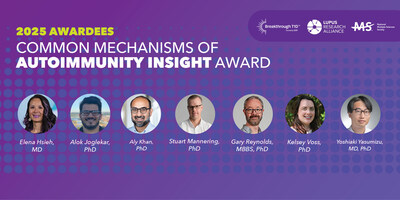Breakthrough T1D, Lupus Research Alliance, and National Multiple Sclerosis Society Award Recipients of First Common Mechanisms of Autoimmunity Insight Award
Nonprofit coalition selects seven esteemed researchers to fuel understanding of autoimmune diseases and accelerate potential therapies
NEW YORK, Sept. 25, 2025 /PRNewswire/ -- Breakthrough T1D (formerly JDRF), the Lupus Research Alliance, and the National Multiple Sclerosis Society today announce the recipients of the Common Mechanisms of Autoimmunity Insight Award, a collaborative effort aimed at expanding the understanding of commonalities and differences across multiple autoimmune diseases and accelerating potential treatments.
Autoimmune diseases are chronic conditions in which the immune system mistakenly attacks the body's own cells, tissues, or organs, leading to inflammation and organ damage. It is estimated that more than 80 autoimmune diseases impact over 50 million people in the United States. Additionally, 25% of individuals with an autoimmune disease are likely to develop a second. Despite its widespread prevalence, there is still much to be learned about how and why these diseases develop.
To that end, seven research projects were selected after a highly competitive and rigorous review of their innovative proposals to investigate shared mechanisms underlying type 1 diabetes, lupus, and/or multiple sclerosis. Each researcher receives up to $150,000 to fund a 1-year pilot investigation – with the goal of identifying novel mechanisms or fueling potential therapies that improve the lives of those living with these diseases.
"Autoimmune diseases such as type 1 diabetes, lupus, and multiple sclerosis each have unique symptoms, but the mechanisms driving the underlying imbalance of the immune system are the same. This is an opportunity to continue our collaboration on research that may provide key insights that benefit everyone," Joshua Vieth, PhD, Senior Director of Research at Breakthrough T1D, said. "By working together to advance our collective understanding of autoimmunity, we can reduce gaps in knowledge, redundancy in funding efforts between the organizations, and ultimately, the time it takes for new therapies to benefit the individuals living with these autoimmune diseases."
By digging into underexplored areas of immune networks, pathways, disease pathogenesis, and heterogeneity, each of the selected awardees is working on innovative projects that address needs across multiple autoimmune diseases that may allow us to make faster progress together. The recipients are:
- Elena Hsieh, MD, University of Colorado Anschutz School of Medicine
- Dr. Hsieh will study how certain immune cells called B cells, which normally protect against infections, can trigger autoimmune diseases when certain checkpoints (safety mechanisms) fail. By studying how B cells behave and how these checkpoints fail, Dr. Hsieh hopes to identify why some people develop autoimmunity and how to stop it. This research could unlock personalized treatments for those affected by autoimmune diseases.
- Alok Joglekar, PhD, University of Pittsburgh
- Dr. Joglekar will test whether blocking a molecule called DOCK2, which helps immune cells infiltrate and damage organs in autoimmune diseases, can prevent or delay autoimmunity in mouse models. If successful, this research could establish DOCK2 as a target for developing novel therapies to treat multiple autoimmune diseases.
- Aly Khan, PhD, University of Chicago
- Dr. Khan will identify tiny protein fragments – called peptides – that may trigger autoimmune diseases. "HLA" proteins, which act like display cases, show these peptides to the immune system. In some people, HLA proteins may present the body's own peptides in a way that sparks harmful immune attacks. By mapping and modeling exactly which peptides bind to risky versus protective HLA types, and where in the body they come from, this work will chart a path toward more personalized and effective treatments that benefit patients across a range of autoimmune disorders.
- Stuart Mannering, PhD, St. Vincent's Institute of Medical Research
- Dr. Mannering's study will focus on helper T cells (CD4+ T cells), which normally orchestrate immune responses to protect us from infection, but can also mistakenly drive autoimmune diseases. Dr. Mannering has developed a simple blood test that can detect these rare, disease-causing T cells. This will allow – for the first time – the analysis of the autoimmune response which underlies the disease process. The test could improve diagnosis, guide treatment decisions, and serve as a powerful tool to develop safer, more effective therapies.
- Gary Reynolds, MBBS, PhD, Massachusetts General Hospital
- Dr. Reynolds will examine why autoimmune diseases trigger inflammation in patches rather than across entire organs. By studying how surrounding tissue resists damage, this research could lead to innovative treatments that protect tissue from damage or restore the immune balance without long-term dependency on medications.
- Kelsey Voss, PhD, University of Virginia School of Medicine
- Dr. Voss is looking at how disrupting a key receptor that transports iron, CD71, could rebalance the immune system. Dr. Voss has generated anti-CD71 nanobodies – a smaller type of antibody – made in alpacas. These nanobodies will be tested in mouse models of autoimmune diseases using clinical samples from humans. Ultimately, this approach may translate to targeted therapies that reduce harmful inflammation while boosting anti-inflammatory immune cell function.
- Yoshiaki Yasumizu, MD, PhD, Yale School of Medicine
- Dr. Yasumizu will study how B cells might be orchestrating the immune system's attacks in multiple sclerosis and type 1 diabetes. Using cutting-edge single-cell RNA sequencing, he will examine which genes are switched on in each B cell, one cell at a time, to begin to piece together the complex chain of events leading to autoimmunity. By comparing thousands of cells across patients, Dr. Yasumizu can detect subtle differences in how certain B cells act or develop, pinpointing genetic signatures or "risk variants" in each person's DNA that could explain why some B cells become harmful. This approach sets the stage for new, tailored therapies and provides a blueprint that could be replicated for other autoimmune diseases.
"Through this process, we asked researchers to come up with ambitious projects showcasing their innovative thinking across diseases – with the hope of uncovering solutions for the millions impacted – and they truly delivered," Maya Bader, PhD, Director of Research at the Lupus Research Alliance, said. "This cross-sector work will help push us beyond what's known in the world of autoimmunity."
Initially launched in 2019, the Common Mechanism of Autoimmunity program has achieved tremendous success in the first round of funded research. One example of this is Alexandra-Chloé Villani, PhD, Massachusetts General Hospital and Harvard Medical School, who is developing and implementing single-cell 'omics' strategies and systems immunology approaches to understand the players and rules governing human immune response regulation as a foundation for deciphering how autoimmune diseases develop and maintained.
"The success of our first awardees already is providing insight to the most promising pathways to target for each disease," James Quinn, PhD, Director of Biomedical Research for the National MS Society, said. "We're energized to see how the next cohort accelerates discoveries that can make life better for people with autoimmune and immune-mediated diseases."
To learn more about the program and selected projects, visit DecodingAutoimmunity.org.
About Breakthrough T1D, Formerly JDRF
As the leading global type 1 diabetes (T1D) research and advocacy organization, Breakthrough T1D (formerly JDRF) helps make everyday life with type 1 diabetes better while driving toward cures. We do this by investing in the most promising research, advocating for progress by working with government to address issues that impact the T1D community, and helping educate and empower individuals facing this condition.
About the Lupus Research Alliance
The Lupus Research Alliance is the largest non-governmental, non-profit funder of lupus research worldwide. The organization aims to transform treatment by funding the most innovative lupus research, fostering scientific talent, and driving discovery toward better diagnostics, improved treatments and ultimately a cure for lupus. Because the Lupus Research Alliance's Board of Directors funds all administrative and fundraising costs, 100% of all donations goes to support lupus research programs. For more information, please visit LupusResearch.org and on social media at: X, Facebook, LinkedIn, and Instagram.
About the National Multiple Sclerosis Society
The National MS Society, founded in 1946, is the global leader of a growing movement dedicated to creating a world free of MS. The Society funds cutting-edge research for a cure, drives change through advocacy and provides programs and services to help people affected by MS live their best lives. Connect to learn more and get involved: nationalmssociety.org, Facebook, X (formerly known as Twitter), Instagram, YouTube or 1-800-344-4867.
![]() View original content to download multimedia:https://www.prnewswire.com/news-releases/breakthrough-t1d-lupus-research-alliance-and-national-multiple-sclerosis-society-award-recipients-of-first-common-mechanisms-of-autoimmunity-insight-award-302566432.html
View original content to download multimedia:https://www.prnewswire.com/news-releases/breakthrough-t1d-lupus-research-alliance-and-national-multiple-sclerosis-society-award-recipients-of-first-common-mechanisms-of-autoimmunity-insight-award-302566432.html
SOURCE Lupus Research Alliance


